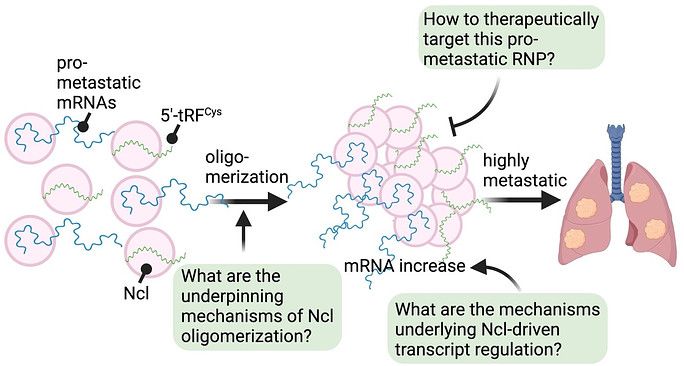Targeting a pro-metastatic RNA-protein complex in breast cancer metastasis
Breast cancer remains a leading cause of death among women. Among the three major subtypes of breast cancer, triple-negative breast cancer (TNBC) has the fewest targeted therapeutic options and the worst prognosis.
Immune checkpoint blockade (ICB) only benefits a small subset of TNBC patients with increased PD-L1 expression. Metastasis is the most significant factor contributing to poor prognosis in breast cancer. Despite decades of research, mechanisms underlying metastasis are still poorly understood, and treatment options for metastatic BC, particularly metastatic TNBC, remain limited.
Our recent research has uncovered the critical role of a pro-metastatic RNA-protein (RNP) complex formed by 5’-tRFCys, a tRNA-derived RNA fragment (tRF), and an RBP Nucleolin (Ncl), in regulating breast cancer metastasis.
(2) What are the mechanisms underlying Ncl-driven transcript regulation?
(3) How do we therapeutically target this pro-metastatic RNP?
Mechanistically, we showed that 5’-tRFCys promotes TNBC tumor growth and metastasis by promoting Ncl oligomerization with its target transcripts, thereby stabilizing a group of pro-metastatic target transcripts.
Therapeutic targeting this pro-metastatic RNP complex by bi-weekly administration of a 5’-tRFCys antisense locked nucleic acid (LNA) oligo significantly suppressed metastatic lung colonization of a breast cancer patient-derived xenograft organoid (PDxO). This result provided a proof of concept for the therapeutic benefit of targeting this pro-metastatic RNP complex.
Given that Ncl is frequently overexpressed in breast tumors and that 5’-tRFCys promotes breast cancer metastasis by increasing the Ncl regulon, targeting Ncl within this pro-metastatic RNP complex is an attractive option to suppress breast cancer metastasis. However, RBPs are generally poor drug targets, as they usually lack well-defined structural pockets required for small-molecule binding.
In this project, we seek to identify actionable therapeutic targets by investigating mechanisms that regulate the activity of this pro-metastatic RNA-protein complex. Ultimately, we aim to translate the insights that we gain from our mechanistic studies to develop new therapeutical approaches to target this pro-metastatic RNA-protein complex.
Given that most of disease-associated RBPs discovered today are not targetable, our study holds great promise in establishing an experimental framework for targeting additional disease-associated RBPs.
See the science
- Liu X, et al. A pro-metastatic tRNA fragment drives Nucleolin oligomerization and stabilization of its bound metabolic mRNAs. Mol Cell. 2022 Jul 21;82(14):2604-2617.e8. doi: 10.1016/j.molcel.2022.05.008.
Connect with the Liu Lab
Department of Pharmacology and Therapeutics
Roswell Park Comprehensive Cancer Center
Elm and Carlton Streets
Buffalo, NY 14263
